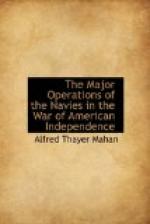In this series of operations, extending from August 22d to December 14th, when Howe went into winter-quarters in New Jersey, the British had met with no serious mishaps, beyond the inevitable losses undergone by the assailants of well-chosen positions. Nevertheless, having in view the superiority of numbers, of equipment, and of discipline, and the command of the water, the mere existence of the enemy’s army as an organised body, its mere escape, deprives the campaign of the claim to be considered successful. The red ribbon of the Bath probably never was earned more cheaply than by Sir William Howe that year. Had he displayed anything like the energy of his two elder brothers, Washington, with all his vigilance, firmness, and enterprise, could scarcely have brought off the force, vastly diminished but still a living organism, around which American resistance again crystallised and hardened. As it was, within a month he took the offensive, and recovered a great part of New Jersey.
Whatever verdict may be passed upon the merit of the military conduct of affairs, there is no doubt of the value, or of the unflagging energy, of the naval support given. Sir William Howe alludes to it frequently, both in general and specifically; while the Admiral sums up his always guarded and often cumbrous expressions of opinion in these words: “It is incumbent upon me to represent to your Lordships, and I cannot too pointedly express, the unabating perseverance and alacrity with which the several classes of officers and seamen have supported a long attendance and unusual degree of fatigue, consequent of these different movements of the army.”
The final achievement of the campaign, and a very important one, was the occupation of Rhode Island and Narragansett Bay by a combined expedition, which left New York on the 1st of December, and on the 8th landed at Newport without opposition. The naval force, consisting of five 50-gun ships and eight smaller vessels, was commanded by Sir Peter Parker; the troops, seven thousand in number, by Lieutenant-General Sir Henry Clinton. The immediate effect was to close a haven of privateers, who centred in great numbers around an anchorage which flanked the route of all vessels bound from Europe to New York. The possession of the bay facilitated the control of the neighbouring waters by British ships of war, besides giving them a base central for coastwise operations and independent of tidal considerations for entrance or exit. The position was abandoned somewhat precipitately three years later. Rodney then deplored its loss in the following terms: “The evacuating Rhode Island was the most fatal measure that could possibly have been adopted. It gave up the best and noblest harbor in America, capable of containing the whole Navy of Britain, and where they could in all seasons lie in perfect security; and from whence squadrons, in forty-eight hours, could blockade the three capital cities of America; namely, Boston, New York, and Philadelphia.”




